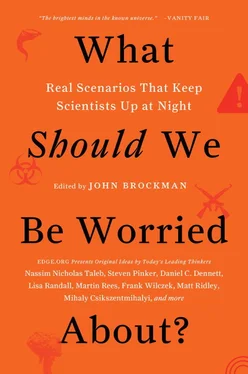It’s not all one-sided. The masses can occasionally organize around a specific issue—SOPA/PIPA, the Arab Spring, and so on—and can block some actions by the powerful. But it doesn’t last. The unorganized go back to being unorganized, and powerful interests take back the reins.
Debates over the future of the Internet are morally and politically complex. How do we balance personal privacy against what law enforcement needs to prevent copyright violations—or child pornography? Is it acceptable to be judged by invisible computer algorithms when being served search results? When being served news articles? When being selected for additional scrutiny by airport security? Do we have a right to correct data about us? To delete it? Do we want computer systems that forget things after some number of years? These are complicated issues that require meaningful debate, international cooperation, and iterative solutions. Does anyone believe we’re up to the task?
We’re not, and that’s the worry. Because if we’re not trying to understand how to shape the Internet so that its good effects outweigh the bad, powerful interests will do all the shaping. The Internet’s design isn’t fixed by natural laws. Its history is a fortuitous accident: an initial lack of commercial interests, governmental benign neglect, military requirements for survivability and resilience, and the natural inclination of computer engineers to build open systems that work simply and easily. This mix of forces that created yesterday’s Internet will not be trusted to create tomorrow’s. Battles over the future of the Internet are going on right now: in legislatures around the world, in international organizations like the International Telecommunication Union and the World Trade Organization, and in Internet standards bodies. The Internet is what we make it, and is constantly being re-created by organizations, companies, and countries with specific interests and agendas. Either we fight for a seat at the table or the future of the Internet becomes something that is done to us.
KAI KRAUSE
Software pioneer; software and graphical user interface designer; philosopher
We all should be worried… that somewhere in New York there is a powerful cultural entrepreneur who is surrounding himself with a couple hundred of the smartest brains and deploying his army of gray matter on… coming up with more stuff to worry about.
Like we have run out of daily doses of crises and cliffs and badly need fresh doom to go with the gloom?
Really, I had hoped that we could have turned this exercise in a useful and positive direction. For instance: “Make a concrete proposal for how $1 billion could be put to the most effective use in 2013” —and then see what that brain pool is really capable of. And actually do it.
There are a few billionaires and many philanthropists among the group. One could quite easily set up an Edge Prize to rival the X Prize , posing concrete problems to overcome in the smartest manner.
This could include science problems per se but also the meta problem of science itself being undervalued, and indeed orphaned to some degree. The Higgs boson means very little to the hick morons who could do with increased education at all levels. And more than bringing up the bottom, there is enormous dormant potential at the top—the smart ones in every class in Anytown, anywhere.
Just as an example: Imagine for one second if literally every child were issued its own xPad. Entirely free. All of them with identical specs , totally shatterproof . With a cloud infrastructure to provide a home for each student, a thin front end containing hardly anything locally, each device just a porthole, neutral and exchangeable. There would be no point in stealing one, a valueless commodity.
The sheer size of the target audience would allow third parties to create brilliant courseware. It would equalize the playing field and raise awareness at all levels. New kinds of classes could be offered, such as how to find answers and solutions, how to search, how to deal with security, the pleasures and pitfalls of the social networks—all those issues that are of much higher importance to kids than the “old-school” curriculum — and which they are left to deal with on their own now.
There are about 80 million people enrolled in education in the United States. Total budget is almost a trillion. You think such a move could make a difference? You bet it would. An extremely cost-effective one, too. There are endless but but buts to intervene, sure. Lots of detail questions, lots to think about. But that is where a think tank of smart folks should be put to great use.
Just making that itself an Edge Prize: the best proposals for implementation, leading to hundreds of them, with a system for peer review to let the truly smart ideas bubble to the top —as opposed to handing it off to some supposed “expert” study group, glacial government processes, or lobbied interests of the industry. You ask this question in the schools themselves, and you would be amazed at the number of detailed problems you can worry about… but also solutions and suggestions!
The trick would be to create the system in which the best ideas can be rewarded. You really think Apple needs to have $126 billion in cash reserves and would not be fine with $124 billion? I bet they would love to help, if not for entirely altruistic reasons—and so would all the others. Given the proper proposal, at a large scope, it is actually not the money that is the problem.
And there you are, with what I feel. We should be worried that this is not happening.
And I do not mean this one lone xPad example idea, pulled out of a hat. I mean the principle itself: We don’t see that all the problems have become much too complex to be solved by our current methodology: The way the government is defined, the way it is run, the way it is chosen, the way it is funded, how it deploys the funds— it is all broken…. Nothing to do with left or right, but seeing it as abstractly as possible, the individuals, in their contract with society as a whole , are on the edge of canceling.
And the only way out of all this is applied sciences, if you think about it: Smart thinking, intelligent planning, systematic analysis; beyond partisan opinions, outside corporate brands, without financial gain. Dealing with it almost as an art form: the beauty of an optimal path, the pleasure of finding a solution.
And there are the people who can do it, who have dedicated themselves to exactly these processes all their lives—alas, only in their narrow sub-sub-sub-fields.
The state of the planet is the crowning super problem of them all—and yet the people who may be able to provide insights and offer fresh ideas are often occupied by trivial and mundane side issues, it seems. Such as answering questions about whether they can think of more things to worry about.
THE PARADOX OF MATERIAL PROGRESS
ROLF DOBELLI
Founder, Zurich.Minds; journalist; author, The Art of Thinking Clearly
I recently had dinner with a friend, a prominent IP lawyer, at his mansion in Switzerland, one of the few spots directly on Lake Zurich. As is customary with people who have mansions, he gave me the complete tour, not leaving out the sauna (how many different ways are there to decorate a sauna?). The mansion was a fireworks display of technological progress. My friend could regulate every aspect of every room by touching his iPad. “Material progress,” he said during his show, “will soon come to every home.” Stories of high-tech, high-touch houses have been around for decades, but it was still neat to see that it finally exists. Sensing my lack of amazement, he guided me to his “picture room.” Photographs on display showed him with his family, on sailboats, on ski slopes, golf courses, tennis courts, and horseback. One photo he seemed especially proud of showed him with Pope Benedict XVI. “A private audience,” he said.
Читать дальше












